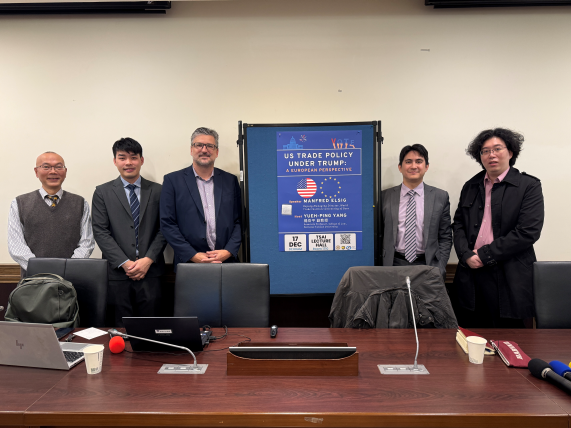
On December 17, 2024, the Asian Center for WTO and International Health Law and Policy, College of Law, National Taiwan University, hosted a thought-provoking seminar titled “U.S. Trade Policy Under Trump: A European Perspective.” The event featured a keynote lecture by Professor Manfred Elsig, the Deputy Managing Director of the World Trade Institute (WTI) at the University of Bern and an internationally recognized expert in global trade governance and international economic law.
The seminar opened with welcoming remarks from ACWH's Director Yueh-Ping (Alex) Yang, who underscored the timeliness and importance of the discussion as global trade policies continue to evolve amid shifting geopolitical dynamics.
In his keynote address, Professor Elsig traced the historical development of U.S. trade leadership from its post-World War II role as a “benign hegemon” to the Trump administration's “America First” approach. He examined how U.S. trade strategies evolved from the Bretton Woods system and embedded liberalism to the unilateral protectionist measures adopted under Trump. Professor Elsig discussed key turning points such as the “Nixon Shock” of the 1970s, trade conflicts under Reagan, and the rise of the Washington Consensus.
Professor Elsig's presentation focused on the defining features of the trade policy during Trump's Administration. He identified mercantilism and protectionism as the core pillars of Trump's approach, which aims to reduce trade deficits, address alleged currency manipulations, and emphasize national security. He highlighted significant measures such as the Section 232 tariffs on steel and aluminum, justified under national security grounds, and Section 301 investigations, which targeted China’s industrial policies, intellectual property practices, and state subsidies.
The U.S.-China trade war emerged as a central theme, with tariffs on Chinese imports reaching 15-25%. Professor Elsig also analyzed the Phase One trade agreement between the two nations, noting that China only partially met its commitments under the deal. Trump's broader withdrawal from multilateral agreements, such as the Trans-Pacific Partnership (TPP) and stalled negotiations on the Transatlantic Trade and Investment Partnership (TTIP), further exemplified his administration’s preference for unilateralism.
Looking beyond Trump's term, Professor Elsig discussed the continuity and change under President Biden's administration. While the rhetoric shifted to a more multilateral tone, U.S. trade policy remained protectionist, now framed as “worker-centric.” He pointed to major legislative efforts like the CHIPS and Science Act and the Inflation Reduction Act, both aimed at strengthening strategic industries such as semiconductors and clean energy. Export controls on dual-use technologies to China were also addressed as a continuation of Trump-era policies.
In his forward-looking analysis, Professor Elsig speculated on the future trajectory of US trade policy under a potential “Trump 2.0.” He posited that a second Trump administration might pursue full decoupling from China, impose higher tariffs on imports, and reinforce unilateral trade strategies. He also highlighted the EU's strategic response, balancing economic autonomy, supply chain resilience, and green initiatives to navigate an increasingly uncertain trade landscape.
The Asian Center for WTO and International Health Law and Policy extends its gratitude to Professor Manfred Elsig for his enlightening lecture.